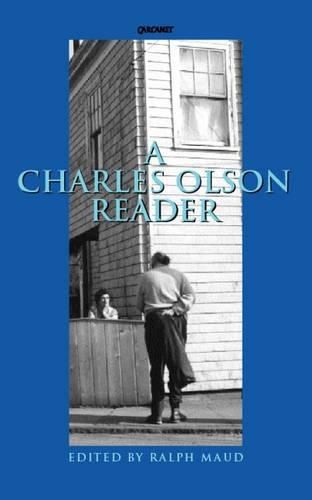Readings Newsletter
Become a Readings Member to make your shopping experience even easier.
Sign in or sign up for free!
You’re not far away from qualifying for FREE standard shipping within Australia
You’ve qualified for FREE standard shipping within Australia
The cart is loading…






Charles Olson (1910-70) is credited with inventing the term ‘post-modern’. Father of the Projectivist movement and one of the great teachers of his age, he is also one of its great poets, a writer whose work has had an abiding impact on radical currents of American and British poetry. The son of working-class immigrants, Olson grew up in Gloucester, Massachusetts, north of Boston, on the sea, and Gloucester is at the heart of his mature poetry. He studied at Harvard and, after working for the Roosevelt government during the war, taught at Black Mountain College, North Carolina. As rector of the college in the early 1950s he attracted creative artists and spearheaded the campaign against the New Criticism. A number of important artists and writers were associated with Black Mountain: De Kooning, Kline and Rauschenberg, John Cage, John Dewey. Robert Creeley’s Black Mountain Review was an ambitious magazine. Poetry, Olson says, is an ‘open field’ through which the poet transfers energy to the reader - but only the reader who is prepared, and preparation involves opening the ear and clearing it of the conditionings of traditional verse and prejudices of preconception. ‘Yes, yes, we must, must, must get rid of the drama, at all costs - I mean, even get rid of narrative - the temptation, you hear’? The source of the poem is the body and being of the poet, the poem should engage the body and being of the reader. This Reader draws on the full range of Olson’s poetry. It includes extracts from his prose, including the essay on Projectivism, memoirs, letters and other vital material, and some key photographs.
$9.00 standard shipping within Australia
FREE standard shipping within Australia for orders over $100.00
Express & International shipping calculated at checkout
Stock availability can be subject to change without notice. We recommend calling the shop or contacting our online team to check availability of low stock items. Please see our Shopping Online page for more details.
Charles Olson (1910-70) is credited with inventing the term ‘post-modern’. Father of the Projectivist movement and one of the great teachers of his age, he is also one of its great poets, a writer whose work has had an abiding impact on radical currents of American and British poetry. The son of working-class immigrants, Olson grew up in Gloucester, Massachusetts, north of Boston, on the sea, and Gloucester is at the heart of his mature poetry. He studied at Harvard and, after working for the Roosevelt government during the war, taught at Black Mountain College, North Carolina. As rector of the college in the early 1950s he attracted creative artists and spearheaded the campaign against the New Criticism. A number of important artists and writers were associated with Black Mountain: De Kooning, Kline and Rauschenberg, John Cage, John Dewey. Robert Creeley’s Black Mountain Review was an ambitious magazine. Poetry, Olson says, is an ‘open field’ through which the poet transfers energy to the reader - but only the reader who is prepared, and preparation involves opening the ear and clearing it of the conditionings of traditional verse and prejudices of preconception. ‘Yes, yes, we must, must, must get rid of the drama, at all costs - I mean, even get rid of narrative - the temptation, you hear’? The source of the poem is the body and being of the poet, the poem should engage the body and being of the reader. This Reader draws on the full range of Olson’s poetry. It includes extracts from his prose, including the essay on Projectivism, memoirs, letters and other vital material, and some key photographs.